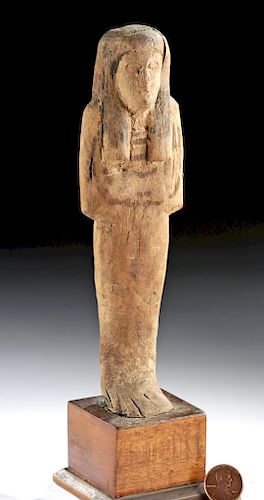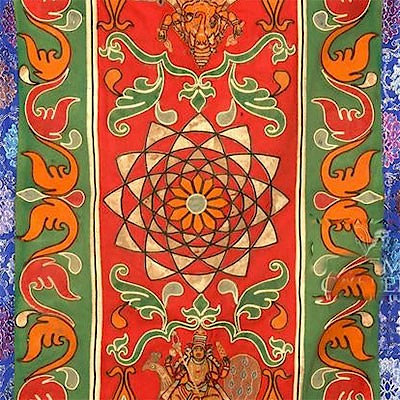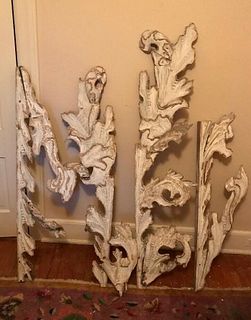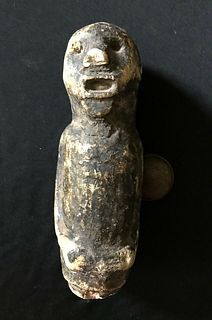Rare Egyptian Late Dynastic Wooden Ushabti
Lot 16
About Seller
Artemis Fine Arts
686 S Taylor Ave, Ste 106
Louisville, CO 80027
United States
Selling antiquities, ancient and ethnographic art online since 1993, Artemis Gallery specializes in Classical Antiquities (Egyptian, Greek, Roman, Near Eastern), Asian, Pre-Columbian, African / Tribal / Oceanographic art. Our extensive inventory includes pottery, stone, metal, wood, glass and textil...Read more
Estimate:
$1,600 - $2,400
Absentee vs Live bid
Two ways to bid:
- Leave a max absentee bid and the platform will bid on your behalf up to your maximum bid during the live auction.
- Bid live during the auction and your bids will be submitted real-time to the auctioneer.
Bid Increments
| Price | Bid Increment |
|---|---|
| $0 | $25 |
| $300 | $50 |
| $1,000 | $100 |
| $2,000 | $250 |
| $5,000 | $500 |
| $10,000 | $1,000 |
| $20,000 | $2,500 |
| $50,000 | $5,000 |
| $100,000 | $10,000 |
| $200,000 | $20,000 |
About Auction
By Artemis Fine Arts
Oct 17, 2019
Set Reminder
2019-10-17 10:00:00
2019-10-17 10:00:00
America/New_York
Bidsquare
Bidsquare : Early Fall Variety | Ancient & Ethnographic
https://www.bidsquare.com/auctions/artemis-gallery/early-fall-variety-ancient-ethnographic-4538
Discover incredible lots relisted with new, lower start prices (up to 50% less), plus many items brand-new to auction. Step back in time and around the world – you’ll be amazed at the treasures you will find. Antiquities from the Classics, Asian, Pre-Columbian African and much more! Artemis Fine Arts info@artemisfinearts.com
Discover incredible lots relisted with new, lower start prices (up to 50% less), plus many items brand-new to auction. Step back in time and around the world – you’ll be amazed at the treasures you will find. Antiquities from the Classics, Asian, Pre-Columbian African and much more! Artemis Fine Arts info@artemisfinearts.com
- Lot Description
**Originally Listed At $800**
Egypt, Late Dynastic Period, 26th to 31st Dynasty, ca. 664 to 332 BCE. A rare example of an ushabti carved from hard wood. The figure stands in mummiform with fused legs atop a short, integral plinth, has elbows protruding from the sides, holds the symbolic pick and hoe in arms crossed atop the chest in faded black pigment, and boasts a painted broad collar pectoral atop the chest. The serene visage is composed of almond-shaped eyes, a slender nose, full lips, and a rounded chin, all beneath a simple tripartite wig. Faint traces of blue, black, and red pigment are visible across the obverse side of the figure. Size: 2.1" W x 7.375" H (5.3 cm x 18.7 cm); 8.7" H (22.1 cm) on included custom stand.
Ushabti dolls are figures shaped like adult male or female mummies wearing traditional ancient Egyptian headdresses. The ancient Egyptians believed that after they died, their spirits would have to work in the "Field of Reeds" owned by the god of the underworld, Osiris. As a result, they are frequently depicted with arms crossed, holding picks and hoes, with baskets on their backs. This meant that the task of agricultural labor was required by all members of society, from workers to pharaohs. The wealthier nobility in Egyptian society were able to have ushabti made of faience, though wood was a more economical option for members of lower classes.
Provenance: private New York, New York, USA collection; ex-private New York, USA collection
All items legal to buy/sell under U.S. Statute covering cultural patrimony Code 2600, CHAPTER 14, and are guaranteed to be as described or your money back.
A Certificate of Authenticity will accompany all winning bids.
We ship worldwide and handle all shipping in-house for your convenience.
#146354Repairs to head as shown, with chips to white filler plaster on verso, and losses to areas of feet and verso. Minor abrasions to legs, body, and head, with a few stable hairline fissures, extensive fading to original pigment, and light encrustations. Light earthen deposits as well as fine patina throughout.Condition
- Shipping Info
-
All shipping is handled in-house for your convenience. Your invoice from Artemis Gallery will include shipping calculation instructions. If in doubt, please inquire BEFORE bidding for estimated shipping costs for individual items.
-
- Buyer's Premium



 EUR
EUR CAD
CAD AUD
AUD GBP
GBP MXN
MXN HKD
HKD CNY
CNY MYR
MYR SEK
SEK SGD
SGD CHF
CHF THB
THB














